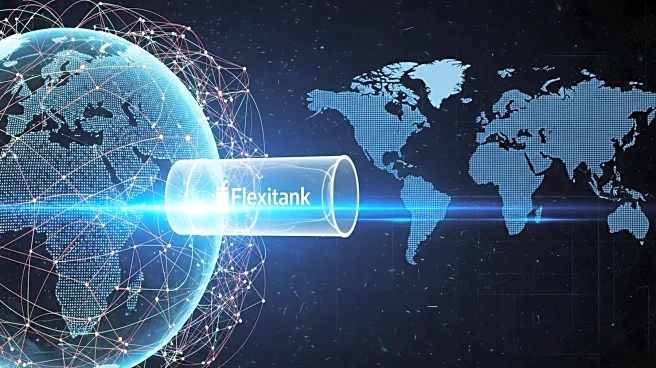What is the story about?
What's Happening?
The flexitank market is experiencing significant growth, with projections indicating an increase from USD 847 million in 2024 to USD 2.06 billion by 2034. This growth is driven by the globalization of liquid trade, particularly in food-grade liquids, and the demand for cost-effective and eco-friendly packaging solutions. Flexitanks offer a flexible, reusable storage system for transporting large volumes of non-hazardous liquids, reducing transportation costs and minimizing contamination risks. The technology is widely used across various industries, including food & beverage, chemical, pharmaceutical, and agriculture. Key players in the market include Braid Logistics, SIA Flexitanks, and TransOcean Bulk Logistics.
Why It's Important?
The expansion of the flexitank market is crucial for industries reliant on bulk liquid transportation, offering a sustainable and efficient alternative to traditional methods. The increased adoption of flexitanks supports global trade, particularly in the export of food-grade liquids, and aligns with sustainability goals by reducing packaging waste. The market's growth reflects broader trends in logistics and supply chain optimization, impacting exporters and logistics providers. As industries prioritize eco-friendly solutions, flexitanks represent a shift towards more sustainable practices in global trade.
What's Next?
The flexitank market is expected to continue its growth trajectory, driven by innovations in material science and the adoption of biodegradable flexitanks. Strategic partnerships and digital logistics integration will play a key role in expanding market reach, particularly in emerging economies. The focus on sustainability and cost efficiency will likely lead to increased demand for flexitanks, with manufacturers investing in advanced monitoring systems and temperature-controlled transport solutions.
Beyond the Headlines
The flexitank market's growth highlights the importance of sustainability in logistics and packaging. As industries seek to reduce their environmental impact, the development of biodegradable and recyclable flexitanks represents a significant advancement. Additionally, the integration of IoT and RFID sensors for real-time tracking enhances safety and efficiency in liquid transportation, setting new standards for the industry.
















